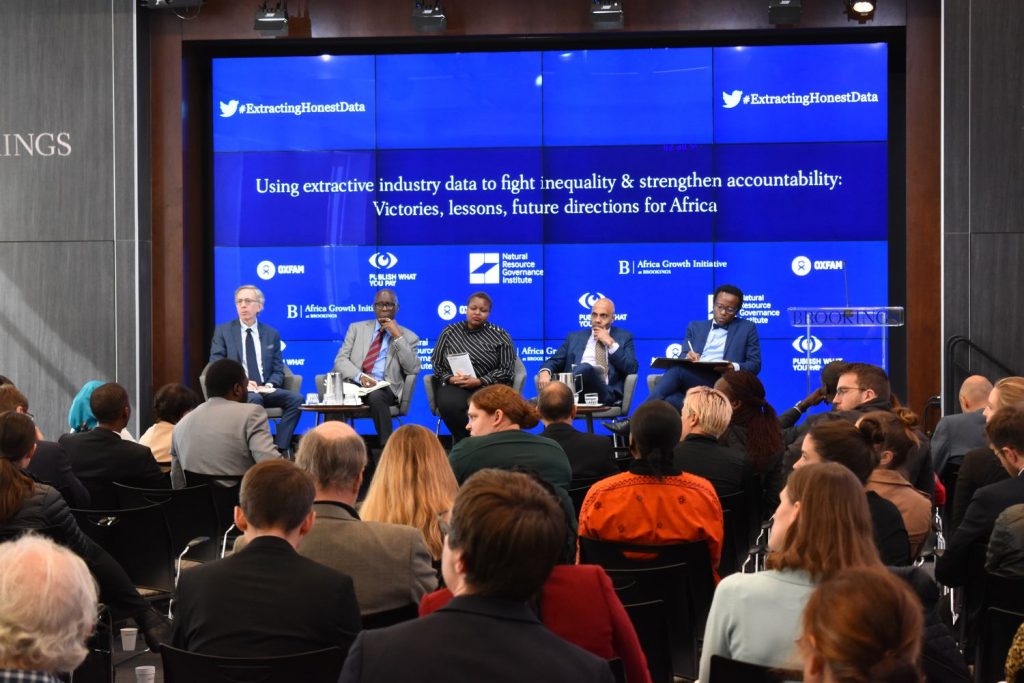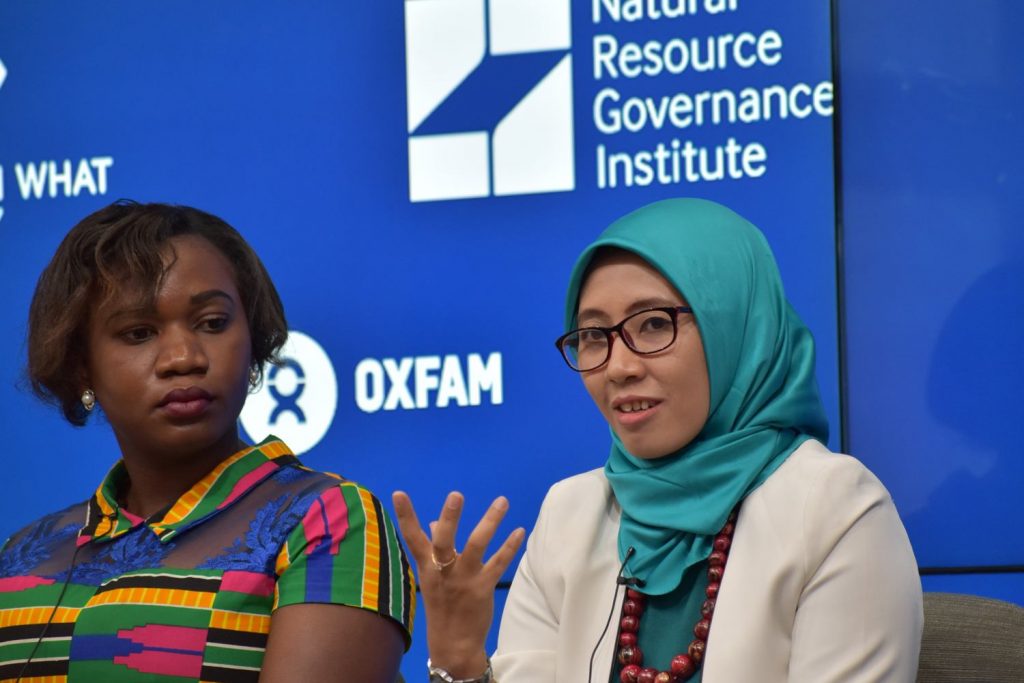On October 24 (2019), the Brookings Intitute for Africa Growth Initiative, alongside Oxfam, the Natural Resource Governance Institute, and Publish What You Pay, co-hosted a two-panel public event to showcase victories and lessons learned in utilizing extractive industry transparency disclosures for the wider sustainable development and economic growth agenda. The first panel featured case studies of how data has been used to contribute to the broadening policy change efforts. And the second panels after a short break, a diverse set of issue experts will react to the case studies, discuss emerging lessons, and comment on future directions for the transparency, accountability, and natural resource governance fields.

The public event was opened by Brahima S. Coulibaly, Senior Fellow and Director, Africa Growth Initiative, Brooking Institute. Brahima introduced two main focus Brooking’s program in Africa to leverage and contribute in improving sustainable living standard. Its including: first, financial resources assistant, the strengthening natural resources government could improve resource mobilization for better economic development, in particular also regarding the oversee development assistant (ODA). Second, how we design policy for natural resources management in the way that they aligned with overall structure of transformation agenda, job creations, and poverty alleviation. For both areas, Brahima emphasized that the data is central, data is unique to pursue if we want for better good governance.
Daniel Kaufman, President and CEO of Natural Resources Governance Institute (NRGI) was giving speech to highlight the important of data utilization works in collaboratively around the globe and actors such as data which related to production, revenue, tax and many others. He said thanks to mandatory disclosure of UK and Canada that open many revenue payment. He also thanks to EITI with now additional disclosure to contract, beneficial ownership, and environmental data. “We need to go to the next steps together”. Daniel emphasized that, data is needed to address the corruption and lack of responsibility regarding the development.
The first panel in this public event including Elyvin Nkhonjera, Program Coordinator of Extractive Industries, Oxfam in Malawi; Barnaby Pace, Campaigner of Global Witness; Maryati Abdullah, National Coordinator of Publish What You Pay Indonesia; and Don Hubert, President of Resource for Development Consulting. The panels hosted by Isabel Munilla, Policy Lead of Extractive Industries, Oxfam America.
Elyvin was shared about her works in open contract that they used to create multi-stakeholder dialogue for ‘the best deals’ of petroleum sharing agreement in Malawi. Where from contract openness, the stakeholder started to discuss how many percent of sharing that government and country will get, how many jobs will create and how contribution of the contract could address poverty and inequality. Elvyin and Oxfam provided economic analysis to challenge the benefits of the oil and gas operation for the peoples. Civil society also recommended to the Government to improve the profit-sharing of the petroleum sharing agreement.
Barnaby Pace from Global Witness shared his work in anti-corruption and open contract, particularly in his finding case in Nigeria. Barnaby said that EI companies corruption is most complex, international deals criminality and the investigation is very challenging. Barnaby shared the case of Nigeria where the petroleum sales money goes to the high official government pocket, and being part of money laundering cases. Barnaby emphasized the important of open contract and beneficial ownership used to monitor the corruption cases.

Maryati Abdullah, Director of Publish What You Pay Indonesia was shared the experience on working with Corruption Eradication Commission (KPK) on Supervision in the mineral and coal sectors: on using data checking and triangulation to monitor the compliance of extractive sector in the area of license spatial maps, production and sales, tax and revenue payment, and also obligation of company to provide environment rehabilitation and post-mining funds. In other case, Maryati shared the experience of coalitions on working with the local partner of coalition member (FITRA Riau) and Local Government on developing innovation for redistribution of oil and gas revenue in the local level. Pelalawan is one of top ten district who receives the biggest revenue sharing from Oil and Gas in Riau Province. The model of benefit sharing from extractive industries revenue was created by using public fiscal management system that shared from central to local government. This innovation particulalry through using space of authority that own by the Local Government, namely Village Funds (Dana Desa). Using space of fiscal discretion owned by the Regent, Village Funds was functioned as scheme of resource redistribution from oil and gas reserve. Pelalawan is one of pilot project of PWYP Indonesia and FITRA Riau in creating local scheme of oil and gas revenue sharing to redistribute through village funds to the ring-1, ring-2, and ring-3 of village in surrounding oil and gas wellhead operations. This kind of benefit sharing model replicates from Bojonegoro district model previously. While, in the Bojonegoro Disctrict, Civil Society Organization with the Local Government are eager to monitor the cost recovery of operation from oil and gas field. Local stakeholder also demanded transparency of calculation and projection of revenue sharing from central to local government, namely Dana Bagi Hasil (DBH), that transferred every trimonths.
Don Hubert from Resource for Development Consulting reminded the forum that the extractive industries is a capital intensives, while there are many data and information variable that needed to analyse the industries in systematic economic view. As a common lesson learnt that we need to make sure the sales of unrenewable asset could be transferred to human development. As we know the popular resource curse term such that the oil is such “too much money too fast” which means that we need to manage its properly. We also need to be carefully with revenue projection, because bad revenue forecasting could make a country trapped in the debt, because the different monetizing methods and other cases. Beyond the transparency and data, there are knowledge and analysis capacity that could lead the effective changes.
The second panels of the public event invited (1) Kerfalla Yansane, Ambassador of Republic of Guinea; (2) Vera Mashana, Program Officer Natural Resource and Climate Change of Ford Foundation; (3) Ashok Parameswaran, Founder of Emerging Markets Investors Alliance; and (4) Landry Signe, Fellow of Africa Growth Initiative, Brooking Institution. The session was leading by Ian Gary, Director, Power and Money Program of Oxfam America.
The second session started by Ian Gary with the leading story about inequality: where there are many aspects of inequality point of view, rich vs poor, urban vs rural population, indigenous vs non-indigenous population, inequality information, knowledge, access and many things that need to be addressed. The first panel, Kerfalla Yansane, Ambassador of Republic of Guinea speaks the topic on values of transparency and accountability initiative. Mr. Ambassador highlighted the important thing that we need to address is governance that is combined with the capacity, both human capacity and also resource capacity. “If the capacity is missing, there are asymmetric information between company and country, which creates gaps on the expectations and also on the outcome of the deposits. Mr. Ambassador was giving example on the case of Simandou (Iron Ore) mining project: when audit is conducted, there are a corruption findings and the Company obligated to pay penalty about 700 millions to attain the mining rights. After that, the Government create safegurard (transparency and accountability) from the greate level to the graasroots to avoid the similar case in the future.
Ashok, from the Emerging Market Investor Alliances comments on the important topic on why the investor alliances are very much care with the transparency with the main reasons: first, that our clients are very care about that to make sure the investment are productive, and the investor also care with the issue of ESG (environment, social and governance). Second, oil and mining transparency is important for investor cause as its significant part of investiable universe. Over 25 % of the emerging market corporate bond universe is comprised of metals, mining, and oil and gas companies. Over 15% of emerging market equity universe is comprised of material and energy stoc, about 60 percent of the emerging market sovereign debt universe is comprised of countries that export oil and mining products. “So it’s an important part of what we invest in. We can’t avoid investing in these companies and these governments” Ashok said. A third reason why transparency in the extractive sector is important for us is that it affects the valuations of the stocks and bonds that they invest in.
Vera, from the grants making organization of Ford Foundation reminded us on some issues related to the governance and civic space. She critisized the state captured – eventhough we have data-best practices and policy in place, but if the state captured is being the global phenomena, the transparency and justice will be stuck. Vera also higlighted the points of revenue and resourice mobilization which in some cases they (Nat.Res.Rich) are failure, but in other case there is also important things to mobilize the benefits sharing to the people that helps addressing inequality. She also emphasized the issue of digital economy, taxation in extractive and also the energy transitions.
Last but not least, Landry from the Brooking Institute highlighted his points on the lesson learned from the forum. The African Growth Initiatives deeply believe that the domestic resources mobilization from the natural resources are bring a long way in term of outcome and proggress. He highlighted some lesson learnedts from the transparency and accountability works are (1) quality and accessibility of data, their works in oil – gas and mining sector required quality and accessibility of data; (2) independence and quality of analysis it is critical to bring the evidance based solutions. Some of the good works are conducted in Malawi, in Indonesia and etc; (3) the inclusion of civil society process, the public-private-government partnership is important; (4) open accountable table of management in oil, gas and mining sector, where the horizontal and diagonal accountability is importants; (5) the effective legislative process, also including participation of civil society and media; (6) optimal revenue generations, we are speaking about the effective alocation and spending; (7) inter-generations funds, it is important to make sure that the benefit of unrenewable resources are not just for current generations but also transformed to the next generations; (8) to improve the overall governance that its achievable; and (9) global partnership, its is critical such us for G7 or G20 need to aware regarding the illicit financial flows, to make sure that the money are not stolen and transferred, to the other big countries without fairness for example. We need better of commitment of development partner beyond the official and rhetorical [MA].
Related Link:
Video, session-1 : https://www.youtube.com/watch?v=JhBCgSZiDEQ&list=PLP2g3h_bCmB_H-SCPg6bSel-9zw9pAL7m&index=2&t=0s
Video, session-2 : https://www.youtube.com/watch?v=-z2eCMd5yGU
Proceeding: https://www.brookings.edu/wp-content/uploads/2019/10/global_20191024_extractive_africa_transcript.pdf